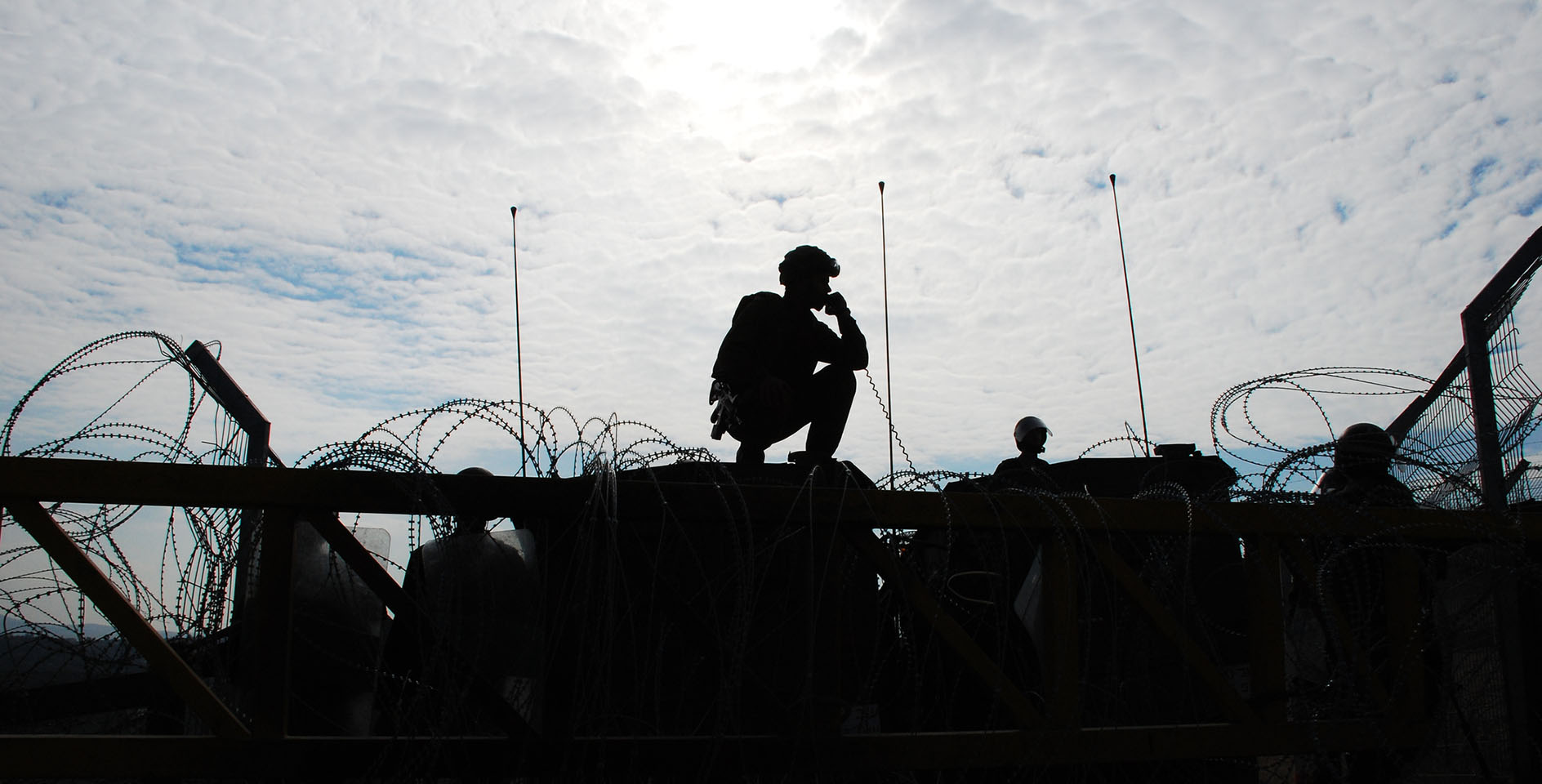In his ISIL speech on September 10, the President outlined a four-part strategy to combat the militant insurgency of the Islamic State in northern Iraq: to “degrade, and ultimately destroy ISIL through a comprehensive and sustained counter-terrorism strategy,” to increase support to Iraqi forces already on the ground, to continue prevention of additional attacks on U.S. interests, and lastly, to provide ample humanitarian aid to communities decimated by the ruthless ISIL advance. On a cursory reading the strategy seems feasible. Perhaps it will even rebuff the threat as promised. The question, however, is whether the strategy follows the rules set down by a longstanding tradition of just war theory. And in pursuing this line of inquiry we must bear in mind a key distinction between the ends sought militarily and the rationale offered for achieving those ends. Military intervention may be morally necessary and justifiable when the rationale offered for intervention is not.
Historically, the rules of war are grouped into three moments: jus ad bellum, jus in bello, and jus post bellum. The first, jus ad bellum, has to do with the decisive questions or issues relevant to deliberations over whether war is to be waged. The second, jus in bello, concerns how war is to be waged once combat has initiated. And the third, jus post bellum, focuses on rules of conduct following the formal completion of war; that is, justice after the war has been “won.” Love cannot be divorced from justice, and in a world where war remains a regrettable necessity, the motivating reasons for conflict, and indeed its guiding rationale, must be justice and charity. In the Just War tradition intervention is always on behalf of a nation, a neighbor, that cannot defend itself against an unjust assailant.
Again, at issue here is not whether intervention is justified in Iraq and Syria—as will be seen, I believe just cause conditions were met long ago—but whether the rationale offered publicly for intervention correspond to rules of Just War theory. Let’s identify a few of these dissonances and then conclude with a few cautionary remarks.
What will it look like to succeed in Iraq? That has been a recurring question since the President’s 9/10 speech: does the U.S. have a reasonable chance of success? The answer to this question depends, of course, on what it might mean to be “victorious” over fanatical terrorism. The first objective in the President’s new strategy remains too vague and does not help us (the American public) grasp what he intends by “destroy.” It is relatively easy to “degrade” a vastly underpowered opponent; experience shows it is comparably harder to destroy it. By what means, exactly, will annihilation of institutionalized resentment be achieved? To what lengths?
The Bush administration’s mistake in 2001-02 was to characterize the U.S. response to the Twin Towers bombing as a War on Terror. To the extent that terror operations are motivated by a violent hatred of the West (especially the U.S.) there is no compelling reason to think that even the world’s greatest superpower with the most sophisticated weaponry known to man could eradicate this hatred from the earth. A War on Terror is not winnable. The Obama administration is not invulnerable to the same mistake. If ISIL is mere proxy for a far more wide-ranging campaign against hostiles in the near East, then “success” in this campaign will invariably prove elusive. Our final objective in Iraq and Syria needs specificity and redirection. If the one of the unforeseen consequences of invading Iraq was to someday invade Syria, then what might be the unforeseeable consequences of invading Syria?
Why, exactly, the administration could tolerate for so long the extermination of Christians and the near genocide of Yazidis but not the beheading of two journalists remains puzzling. Just Cause conditions were met months, if not years ago. I suggest “years” here in part because I think one of the more persistent oversights in current discussions surrounding new military operations is a failure to recognize that their renewal is a direct result of having insufficiently upheld the rules of jus post bellum in the first place. U.S. rebuilding efforts in Iraq were shortsighted and misinformed. For evidence one perhaps need look no further than the forced democratization of Iraq and the protracted political disorder that has resulted from it. Since the hurried withdraw of U.S. troops beginning in 2009, Iraq has been the site of vicious sectarian violence. Defense leadership now acknowledges that early withdraw was injudicious—hence the “new” strategy—and that is also why the current problem has more to do with a failure to uphold jus post bellum than of satisfying jus ad bellum conditions all over again.
In truth, notifying U.S. citizens of the intention to begin targeting strategic ISIL positions was several weeks late and was in any event an aberration of the norm. Airstrikes are currently being conducted in no fewer than six different countries, including now Syria, which has a political situation so horrendous and confusing it is impossible to get anything like a clear picture of what is happening there without requisite security clearances. It is believed that arming and training diverse militias in support of their opposition to the Assad regime will morph later into opposition of ISIL and other radical groups. The American public is being told to prepare for a long martial commitment nevertheless; we simply don’t know when we will be able to extricate ourselves from the region. But of course it is likely that surveillance drones will remain omnipresent long after flags are dropped.
As for the use of drones, I have written elsewhere that the current drone program does not adequately meet the discrimination principle of jus in bellow. The principle of discrimination holds that a necessary distinction must be maintained in warfare between combatant and non-combatant. It is never morally permissible to target civilians deliberately. It may happen that civilian life is lost accidentally as a result of direct combatant targeting, of course, but the negative consequences associated with that action have a different moral status. Since 2001 the defense of drone use has appealed to two empirical benefits, reduced risk of pilot causalities and increased targeting precision. Regarding that second benefit, data furnished by third-party whistleblowers estimates that of the roughly 3000 people killed by unmanned aerials approximately 400-900 are civilian. Some claim that civilians account for closer to a third of all deaths. These numbers strongly suggest the principle of discrimination is being deliberately ignored, and any unmanned aerial targeting that also knowingly accepts the death of noncombatants as a justifiable consequence of targeting combatants is morally impermissible.
The pre-emptivist doctrines that have framed U.S. defense policy for the past several decades are likewise stretched to their logical and practical limits. It is a policy of recurrent anticipation. If the U.S. were to pursue arguably the most important objective in war, establishment of peace, and not primarily on our own behalf but on that of our neighbors, this would represent the most dramatic refocusing of U.S. foreign policy since WWII. The futile quest for political certainty in the near East is a direct contributor to the undermining of any enduring peace. This is not to suggest that some pre-emptive tactics might not be applicable to many novel defense challenges; they undoubtedly might. The problem is rather in thinking we can cancel all contingencies in the world by implementing a comprehensive system of preemptive techniques. Our sprawling surveillance state is but one example of how far the state department is willing to go to throw its net over global communications.
Now, many of the problems outlined above could be circumvented if U.S. officials took seriously the criterion of legitimate authority. In their current form entities like al-Qaida and ISIL are what Augustine would call societies. Neither organization possesses legitimate political authority but are more like robber-gangs united by their common animosity toward the West. Supporting politically legitimate Iraqi and Syrian leaders would go a long way toward achieving our martial aims, only no legitimate authority exists in Syria (hence its civil war) and given the state of affairs in northern Iraq, there isn’t much evidence of public legitimacy there either. If we were to interpret part of the President’s new strategy flexibly as something akin to reestablishment of legitimate government—though it is not at all clear that is what he means—then perhaps a start could be made. Until we are able to state with confidence who we are intervening on behalf of in Syria and how the governmental infrastructure of that nation might be rebuilt, the more definite ends we pursue in Syria, aside from dismantling ISIL, will remain inchoate and malleable.
In this respect what has become increasingly clear is that the War on Terror has not ended—its epicenter has merely shifted geographically. If Afghanistan was phase one and Iraq (for better or worse) stage two, then this new strategy perhaps represents stage three of the War on Terror. The stages will multiply further, I suggest, so long as the U.S. pits itself against Terror and its syndicates (al-Qaida, ISIL, etc.) and not against legitimate authorities accountable to the rule of law. The potential endlessness of this war is represented by the following contradiction: the means we use to “destroy” are the very same means for inspiring radical reinforcement. In other words, the U.S. campaign against terror is also at the same time a campaign for terror in the sense that conflict with ISIL (or any group harboring hatred toward the U.S.) is a tragically effective form of recruitment to ISIL. This is self-defeat by definition.
“Terrorism names a historical conjunction of two distinct phenomena,” suggest Oliver O’Donovan, “the waging of war by disordered means, in defiance of proportion or (especially) discrimination, and the waging of war by military organizations which are not only not governments, or subject to governments, but are not even putative governments, and so have no direct interest in the provision of judgment for any community which they plunge into the turmoil of armed struggle.” This explains quite nicely why jihadist networks are not legitimate authorities—they are not executors but antagonists of justice, and in turn wherever they are their existence is indicative of an acute lack of political authority. So important is the task of nation-building, therefore, a war would be unjust if “it does not intend the state of peaceful and lawful governance for the community against which war is waged.” Its being just does not mean it will be easy, of course. Afghanistan still faces enormous sovereignty challenges. Perhaps the U.S. would do well to allow for alternatives to democracy in these nations with profoundly anti-democratic political theologies.
The U.S. is right to begin airstrikes and to deploy additional ground support in northern Iraq and Syria, but the rationale offered so far in justification of the campaign remain too vague and open-ended. If, in fact, it is doing so for the explicit purpose of intervening on behalf of another nation and of attempting to re-establish peace in that region through reinstallation of governmental infrastructures, then that would more closely resemble an approach adherent to the rules of just war theory. If, however, Syria becomes another Iraq 2003 where we topple governments and write constitutions anew, then, again, these ends won’t be met. Looking forward the real question will be whether this new location for our War on Terror falls under the same logic as before or whether achievable, legitimate ends guide our strategic policies. For my part, I fear intervention will morph almost seamlessly into invasion, and that any tacit hope of establishing peace in the region will deflate under the pressurized exigencies of the campaign. By all appearances we have at present a strategy looking for an end, rather than an end looking for a strategy. Principles from the tradition of just war would have helped a great deal with that, if they had but been consulted.
The view expressed in this commentary belongs solely to the author and is not necessarily the view of the ERLC.










